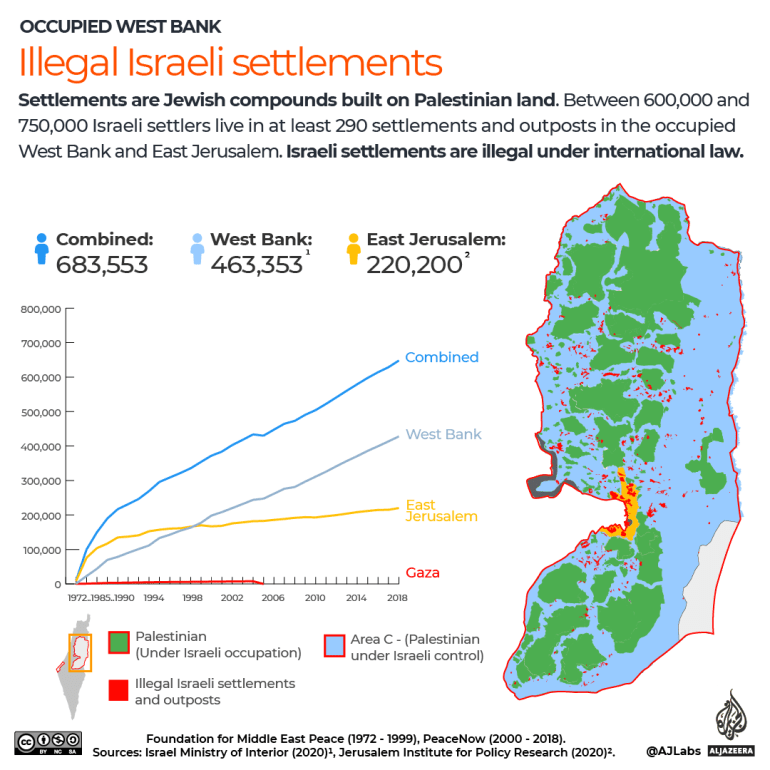Despite growing international condemnation and warnings that the move would sour Israel’s already fragile prospects for a two-state solution, Israeli authorities are moving forward with plans to significantly expand illegal settlements in the occupied West Bank.
The Israeli government has set a meeting on Wednesday to discuss constructing thousands of new housing units in the E1 region, east of Jerusalem, where it is currently occupied. The proposed expansion would effectively divide the West Bank and isolate Palestinian communities by forming a link between Jerusalem and the large, illegal Ma’ale Adumim settlement.
The far-right Israeli government is also about to declare its intention to occupy Gaza as its ongoing genocidal conflict rages on.
The international community, including the European Union and subsequent US administrations, has long been critical of the E1 plan in the West Bank. Following US pressure, Israel put the plan on hold until 2022, but in recent months, the government approved road-widening projects in the area and began enforcing restrictions on Palestinian access, which rights groups claim show a renewed attempt to impose restraint.
International law prohibits Israeli settlements in East Jerusalem and the West Bank. The highest UN tribunal, the International Court of Justice, reiterated that position last year, stating that Israel’s occupation of Palestinian territory must end “as soon as possible.”
Germany reiterated its staunch opposition to the E1 project on Monday.
According to Kathrin Deschauer, a spokesman for the foreign ministry, “we as the federal government firmly reject the E1 settlement project.” We’re concerned that a two-state solution might be possible over the long term.
Nearly 1, 214 hectares (3, 000 acres) of Palestinian land would be taken in exchange for the construction of more than 4, 000 settlements and the construction of hotels and thoroughfares connecting Ma’ale Adumim to West Jerusalem under the proposed plan.
Palestinians claim that the project is a part of wider efforts to “Judaise” East Jerusalem and bolster Israeli occupation of territory in violation of international law.
Palestinian leaders want East Jerusalem, the Gaza Strip, and the West Bank, which Israel captured in the 1967 war, as their new state.
More than 500 000 settlers reside in the West Bank right now, and 220 000 others in East Jerusalem.
The plan has been in development since “the early 1990s,” according to Al Jazeera’s Nida Ibrahim.
According to Ibrahim, “the plan has been described by US officials as devastating and disastrous,” as it threatens “the unity” of a potential Palestinian state.
By the time Western and European nations recognize Palestine as a state, according to Ibrahim, the Israeli goal is to ensure there is “no Palestinian state on the ground.”
She claimed that Israel would “cut the West Bank into so many different sections, fragmenting them, creating what Palestinians have been calling cantons,” and that his would force Palestinians to live in “very small, caged communities.”
expanding West Bank crackdown
The decision comes as part of a wider Israeli crackdown on the West Bank. According to the Palestinian Authority’s Commission of Detainees and Ex-Detainees Affairs, at least 30 Palestinians were detained overnight in several cities, including Hebron, Nablus, Bethlehem, Ramallah, and Tulkarem.
Two women, a journalist, and several former prisoners were among those who were detained. Since Israel launched its genocidal assault on Gaza in October 2023, according to the commission, more than 18,500 Palestinians have been detained in the West Bank.
As Israeli forces expanded the Gush Etzion bloc’s population by seizing more land for settlement expansion, residents of Beit Iskaria village in Bethlehem this week were given forced displacement notices. According to village council leader Muhammad Atallah, soldiers had already ordered him and his family to leave the farmland covered in grapevines in ten days.
Separately, Israeli forces reported that soldiers were reportedly accompanied by settlers in a rural suburb close to the Jalazone refugee camp north of Ramallah. A building that was under construction in Dar Salah, east of Bethlehem, was destroyed by Israeli military vehicles.
In the West Bank alone, in July, 122 structures were targeted for demolition, including 60 homes and dozens of agricultural and livelihood facilities, according to rights groups.
In recent months, there have been more arrests and demolitions in Palestine. Palestinian settlers have rammed through Palestinian villages, torched crops, vandalized homes, and assaulted residents without charge, leading to a number of Palestinian deaths.
As part of a coordinated effort to forcefully remove Palestinians from important West Bank locations, rights organizations and UN officials have warned that settler violence is at an all-time high.
Sheikh Muhammad Hussein, the grand mufti of Jerusalem and the Palestinian territory, has also been prohibited from entering Al-Aqsa Mosque for six months by Israeli authorities.
The Jerusalem governorate, citing lawyer Khaldoun Najm, said Hussein’s eight-day ban had come to an end with the quote from the Wafa news agency.
He criticized Israel’s starvation policy against Palestinians in Gaza after his most recent ban was imposed after his Friday sermon.
Source: Aljazeera

Leave a Reply